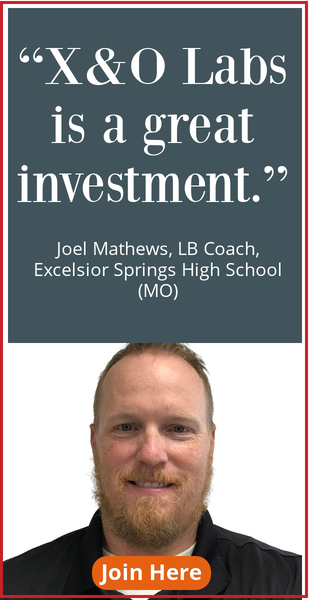By Mike Kuchar
Co-Founder/Senior Research Manager
X&O Labs
Editor’s Note: The following is an excerpt from X&O Labs report “The Player Driven Culture System.”
Logan High School (OH) head coach Mike Eddy takes it one step further by having those that want to be captains, apply for the position. Nothing is assumed, regardless of a player’s seniority, ability, or previous accolades. If a player wants to be captain, he has to go through the process of applying for it, just as he would with any other endeavor after his football career has ended. The benefits are two-fold: one, it serves as an identifier for individuals that are interested in what could be a demanding leadership role within the program; and two, it teaches players the important life skill of self-advocacy. According to Coach Eddy, it is a necessary model to replace both player selected and coach selected nominations. “Players voting on captains often plays into a popularity contest or voting for their friends,” he said. "I believe that often being the leader causes you to be in positions to say and/or do unpopular things. Players who have been selected by their peers are on occasion less likely to make tough decisions when needing to hold others accountable."
In his opinion, when coaches select captains they will very likely select players that have demonstrated leadership skills or players that they believe should be in a leadership position based solely on on-field performance. "The conflict with this approach is, often we don't even know if the player wants to be a captain,” he said. “If the position is simply a reward for a player's dedication and commitment to his team and his only responsibility is the opening coin toss; then fine, anyone you select will make sense. But if you are asking your captains to be examples for your team, hold others accountable to a set standard, and be a resource to those around him; then it better be someone who wanted the position or they will not take the responsibility seriously, or be willing to make a stand in tough situations.”
So, two weeks before his first practice Coach Eddy makes captain applications available upon request. He created a document mirroring a basic job application format, where personal information, contact information, and "work" experience is included.
In addition to the application, candidates are asked to write a response detailing if they have ever quit or been removed from a team. There is a section for specialized training, experience, and skills they possess that they feel qualifies them as a captain. Lastly, they must write a response if they have received any school discipline. References are required, just as they would be in the traditional application process format. Both the player and a parent/guardian are asked to sign the application to verify that they are aware of the expectations. If it isn't signed by the parent/guardian, or the letter of interest is missing then he does not even review the application and they are not considered for an interview.
Not everyone that applies gets an interview and not everyone interviewed is hired as a captain. Coach Eddy schedules all interviews to be held in the school conference room the day before the first practice. "It is a formal (shirt and tie) environment and all assistant coaches help to conduct the meetings," he said. "We work our way around the table with each coach asking a question and then possible follow up questions after the response. I have a series of questions scripted to guide the interview but coaches are free to ask questions of their own if they wish to." After the meeting, there will be an open review session discussing posture, eye contact, body language, and interview techniques with each player. "We do not use this process exclusively when making our selections, but it often provides us with more insight into the player's belief systems, standards, expectations, and leadership techniques," he said. "In addition, it is a great life experience for our players."
The morning before the first practice of the season, Coach Eddy meets with all of the applicants to inform them of the selections. He then announces the captains to the team right before heading onto the field. "I believe that announcing it just moments before the first practice begins allows the players not selected to begin to overcome the disappointment in a positive atmosphere," said Coach Eddy referencing the behavior of resilience, which I write about in Competency 6. "They are in a supportive environment, surrounded by their teammates, and participating in a long-anticipated event."
The event doesn’t end there. The coaching staff volunteers to be a mentor for each player that participated in the process. The reasoning is simple: even though a player may not be selected as a captain, they see themselves as a leader or at the very least aspire to be one of the leaders of the team. Throughout the season, each mentor (coach) will meet with his player a minimum of once a week to offer advice, discuss concerns, provide feedback, or sometimes just simply improve relations with the player. They then provide Coach Eddy with a summary of their meeting so that he can stay up to date on the player's progress and/or team concerns.
All the documentation that Coach Eddy uses during this process - including the interview questions and the application itself - can be found in X&O Labs special report on the Player Driven Culture System.
You can begin reading this study by clicking here
You can purchase a copy of the best-selling book, The Player Driven Culture System, in X&O Labs’ bookstore: Go here.









